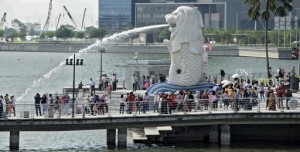Singapore defends population forecast
SINGAPORE—Singapore on Monday defended its population policies after an outcry over a forecast that it could have 30 percent more people in less than 20 years, with foreigners forming almost half the total.
A controversial report issued last week by a government agency said the city-state’s population could reach up to 6.9 million in 2030 from the current 5.3 million.
A third of the population is already made up of foreigners, who have been blamed by Singaporeans for driving up the cost of living, straining public services and causing congestion.
Singapore’s total fertility rate stood at 1.20 children per woman last year, far below the 2.1 needed to maintain the native population. It has languished at the level for more than three decades.
In a parliamentary debate, Deputy Prime Minister Teo Chee Hean said on Monday that the population report was “fundamentally for the benefit of all Singaporeans — ourselves, our children and their children”.
Article continues after this advertisementStressing that the 6.9 million upper end of the forecast was not a target, he said the numbers were laid out “only to prepare infrastructure plans” for the long term.
Article continues after this advertisementTeo reiterated that Singapore needs immigrants to alleviate the shortage of babies and a rapidly ageing population.
“To prevent our Singaporean core from shrinking and ageing rapidly, we will need to augment our population with new citizens and permanent residents.”
He added that the government was still planning to “significantly reduce” the overall growth rate of foreign workers while encouraging Singaporeans to have more babies with cash grants and other incentives.
The opposition Workers’ Party, which won a by-election last month after a heated campaign that involved immigration issues, rejected the government’s population forecast.
“A strong Singaporean core should be made up of Singaporeans who grew up in, and with, Singapore,” Workers’ Party leader Sylvia Lim said in parliament.
“Therefore the policy of topping up shortfalls in our total fertility rate with younger immigrants to make up the Singaporean core is flawed,” she said.
